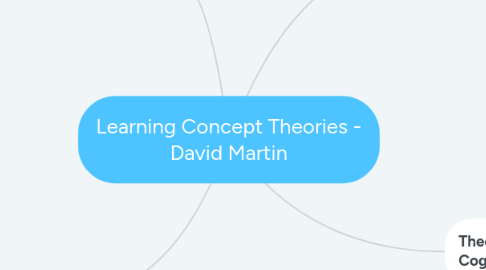
1. Theory 1: Situated Cognition
1.1. Learning occurs when situated within specific context
1.1.1. Learning communities
1.1.2. Active participation by learner
1.1.3. Based on actions
1.1.4. Technology is used as a tool within the community
1.1.5. Madison Meyers & Brent Wilson
1.1.6. Knowledge evolves as learner experiences new situations
1.1.7. Learning situations must be authentic
1.1.8. Instruction must take place in community environment with access to tools
2. Theory 4: Collectivism
2.1. Learning occurs through the impact of diverse opinions and through the process of connecting various information sources
2.1.1. Learning capacity is more important that current knowledge base
2.1.2. Learners must see connections between fields and concepts
2.1.3. Knowledge is connecting people to other people or information sources
2.1.4. The starting point for the learning is the individual
2.1.5. Learners recognize that knowledge is not longer only internal or individualistic
2.1.6. George Siemens
3. Theory 2: Distributed Cognition
3.1. Learning occurs in a designed environment that supports interaction with participants
3.1.1. Phillip Bell & William Winn
3.1.2. Learning in a community of learners where interaction takes place
3.1.3. Interaction is where the development occurs
3.1.4. Technology can facilitate the interaction or be the interaction itself
3.1.5. Technology can be used to extend human capabilities in these environments
3.1.6. Theory supports the skills and knowledge needed in the 21st century
4. Theory 3: Socially Shared Cognition
4.1. Learning occurs through sharing cognition and sharing tools
4.1.1. Katherine Brown & Michael Cole
4.1.2. Learners are required to be active participants
4.1.3. Sharing implies that both learners are learning together
4.1.4. Learning that occurs within the community is being divided between participants
4.1.5. Sharing knowledge is important because no two experiences will be the same for each leaner
4.1.6. Technology, in this theory, is used by the learning community to enhance the experiences
